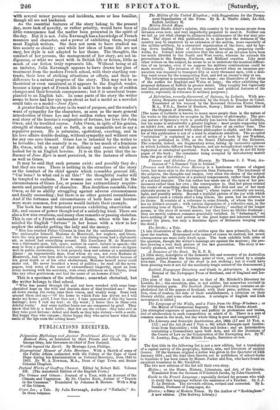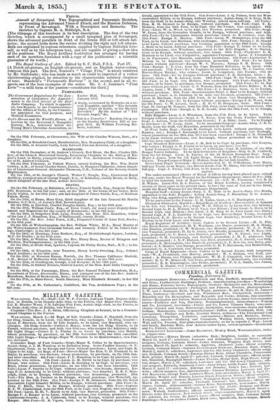PUBLICATIONS RECEIVED.
Booxs.
.Polynesian Mythology and Ancient Traditional History of the New Zealand Race, as furnished by their Priests and Chiefs. By Sir George Grey, fate Governor-in-chief of New Zealand.
Worlds beyond the Earth. By Montagu Lyon Phillips.
Biographical Memoir of John Montagu. With a Sketch of some of the Public Affairs connected with the Colony of the Cape of Good Hope during his Administration as Colonial Secretary, from 1843 to 1853, By W. A. Newman, M.A., Dean of Cape Town and Senior Colonial Chaplain.
Poetical Works of Geopey Chaucer. Edited by Robert Bell. Volume III. (The Annotated Edition of the English Poets.) The Crimea and Odessa : Journal of a Tour, with an Account of the Climate and Vegetation. By Dr. Charles Koch, Author of "Travels in the Caucasus." Translated by Johanna B. Horner. With a Map of the. Crimea.
Grace Lee; a Tale. By Julia Kavanagh,, Author of "Nathalie," &c. In three volumes. The Militia of the United Kingdom; with Suggestions for the Perma- nent Organization of the Force. By R. A. Shafto Adair, Lt.-Col. Suffolk Artillery M.
Militia Sketch Mao.
[In Colonel Shafto Adair's opinion, this country is by no means secure from invasion even now, and very imperfectly prepared to meet it. Neither can i
we tell as yet what change in alliances the continuance of the war may pro- duce. The object of this publication is to show how the defences of the country may be improved by an extension of the militia, more especially of the militia-artillery, by a connected organization of the force, and by lay- ing down leading lines of defence against invaders,. preparing earth- works, &c. Colonel Adair considers that the ideas of an invasion have been too much directed to the South and West coasts, whereas he extends his precautions to the Eastern, Northern, and Midland counties. Like most other writers on the subject, he seems to us to underrate the nautical diffioul- ties of an invader, even if we suppose his military combinations could be made secretly. The invasion of the Crimea showed what an immense pre- paration was required to transport fifty or sixty thousand men, with a mid- way rendezvous for the transporting fleet, and not an enemy's ship at sea. The letterpress is accompanied by two maps;' one illustrative of the ideas of the author for England and Wales at large;. the other exhibiting the proposed defences of Suffolk in greater detail. They roughly but vigorously and indeed pictorially mark the great natural and artificial features of the country, especially in reference to military purposes.]
A Refutation, recently discovered, of Spinoza, by Leibnitz. With pre- fatory Remarks and Introduction by the Count A. Toucher de Carel Translated at his request by the Reverend Oetavius Freire Owen, M.A., F.S.A., Rector of Barstow, Surrey; Editor and Translator of the Organon of Aristotle, &o.
[The name of Leibnitz is known to many more people than is the nature of his works or the station he occupies in the history of philosophy. The pre- cise nature of Spinoza's work is probably less known than that of Leibnitz, but his name is undoubtedly a greater bugbear ; most people supposing him an infidel Jew, and a sort of learned Tom Paine of an earlier time. The popular interest connected with either philosopher is slight, and the charac- ter of this publication is not of a kind to stimulate attention. The so-called "refutation" is contained in a sort of notice of a book by one Wachter, which he published in 1706, on the Secret Philosophy of the Hebrews. The remarks, indeed, are fragmentary notes, taking up successive opinions in which Leibnitz differed from Spinoza, and are metaphysical replies to me- taphysical or ontological questions. Such as they are, they do not fill forty pages of the book ; the remainder being occupied by introductory matter from the pen of the editor.]
Frescoes and Sketches from Memory. By Theresa C. J. West, Au- thoress of "A Summer Visit to Ireland."
[Frescoes and Sketches from Memory is a handsome volume of elegant verse, but more akin to the drawingroom than Parnassus. The treatment of the subjects, the thoughts and images, very often the choice of the subject itself, argue the cultivation of a poetical temperament, rather than the gush of a natural impulse. The fair author has made use of the eyes of her pre- decessors rather than her own ; the consequence is, that her pieces remind the reader of something other than nature. Her first and one of her most elaborate poems is " The Sedan-Chair "- whose topics evidently are social, light, and possibly satiric. Beyond a truthful picture of the joy with which she entered such a vehicle after a long illness, the poem has no relation to its theme. It consists of a reference to some friends, of whom the reader has no distinct account ; with various digressions of a reflective east, in the moralizing tone of Byron. " The Sisters of Charity," another of the longer poems, is the story of several sisters; but they have no lifelike freshness ; they are merely common romance gracefully versified. In "Sebastopol," we have nothing of the real actions or the great hopes and interests centered around the place, but only a feminine figure of Britannia weeping over the dead.] The Strike; a Tale. [A. tale illustrative of the effects of strikes upon the men primarily, but also upon the masters. Economical evils cannot of course. be omitted, but moral consequences are more fully dwelt upon. The book exhibits both sides of the question, though the writer's leanings are against the masters ; the pre- face drawing a very dark picture of the last generation. The story is na- turally planned, and well written.] A Romance of the Bush. By E. P. R. [A. little story, descriptive of the domestic life and economy of an Australian squatter, painted from the feminine point of view, and varied by a simple love-tale. The Romance of the Busk is not striking-; but. it would have been pleasing were it not for the needlessly tragic nature of the denouement.] Scottish Newspaper _Directory and Guide to Advertisers. A complete Manual of the Newspaper Press of Scotland, and of England and Ire- land.
fThe plan of this book is similar to that of Mr. Mitchell's Directory for London, &c. ; the execution, also, is not unlike, but somewhat overlaid in the introductory parts. The Scottish Newspaper Directory contains an al- phabetical list of the papers of Scotland, with their price, politics, circula, tion, class of readers, the date of their establishment, a criticism on their literary ability, and some other matters. A catalogue of English and Irish newspapers is added.] The Language of the Walla, and a Voice from the Shop-Windows ; or the Mirror of Commercial Roguery. By One who Thinks Aloud. [An attempted exposure of quackery and puffery in professions and trades, and of adulteration in such commodities as admit of it. There is a sort of common sense in the book, but the whole thing is poor and exaggerated.] The Literary and Scientific Institutions Act, 1854 (17 and 18 Viet. e. 112) ; and the Act (6 and 7 Viet. o. 36) which Exempts such Institu- tions from Rateability ; with Notes and Index : awl an Introduction containing a Commentary upon both Acts, and all the Decisions of the Courts of Law on the Construction of the Exempting Act. By-W. G. Lumley,-Esq., of the Middle Temple, Barrister-at-law.
The first title in the following list is not a new edition, but a translation of a capital survey of the geography, history, arts, and literature of ancient Greece. Of the German original a notice was given in the Spectator of 14th January 1864; and the hint then thrown out to publishers of school-books to translate it has been taken by Messrs. Parker and. Son, who have found an excellent translator in Mr. Oxenford.
The two new editions of the list tell their own story.
Hellas ; or the Home, History, Literature, and Art, of the Greeks. Translated from the German of Friedrich Jacobs, by John Oxenford.
Guide to the .French Language; especially devised for persons who wish to study that language without the assistance of a Teacher. By J. J. P. Le Brethon. The eleventh edition, revised and corrected. By L. Sandier, Professor of Languages, &c.
Electra; a Story of Modern Times. By the Author of "Rockingham." A new edition. (The Railway Library.)
Puntrs.
Assault of Sevastopol. Two Topographical and Panoramic Sketches, representing the Advanced Lines of Attack, and the Russian Defences, in Front of Sevastopol. With a Description and Remarks. The sketches by Captain M. A. Biddulph, R.A. [The titlepage of this brochure is its best description. The first of the two sketches, which is accompanied by a small marginal plan of Sevastopol, shows the advanced parallels in front of the Green Hill or left attack bat- teries ; the second looks down the ravine dividing the right and left attacks. Both are explained by copious references, supplied by Captain Biddulph him- self, as well as by the letterpress text, and are capable of giving a clear idea of the positions. The Royal Artillery Institution has arranged for having each of its members furnished with a copy of the publication : a tolerable guarantee of its worth.] The Royal Gallery of Art. Edited by S.. C. Hall, F.S.A. Part IV. [A Dutch oil-picture, an English oil-picture, and an English water-colour, compose this part. The first, Teniers s " Village Fête,' is nicely rendered by Mr. Outhwaite ; who has made as much as could be expected of a rather uninteresting original, by attention to the characteristic subdued clearness of tone. Stanfield's "Portsmouth Harbour" is the second, and in all Iv- spects one of the best examples of the series. Mr. J. J. Jenkins 's "First Love "-a mild form of the passion-constitutes the third.]
PAMPHLETS.
The Government Regulations for the Era- Exeter Hall, Tuesday Evening, 23d msnatum of Candidates for Appoint- January 1855. meets to the Civil Service of the East India Company. To which is append- ed, two Reports to the Commissioners for the Affairs of India, by the Commit- tee appointed for that purpose, and Medical Examiners.
God's Heroes and the World's Heroes. A Lecture by the Reverend J. Hampden Gurney, M.A., delivered before the Young Men's Christian Association, in. A Reply, occasioned by Remarks on a re- cent Pamphlet, entitled "The Seventh Angel, Peace on Earth, or the Mystery Revealed." By the Author of " The Seventh Angel," &c.
What is a Traveller? Random Chi p .ers on the Sunday Restriction Bill or Au- gust 1854. By William Prowling Ro- berts, Solicitor.



























 Previous page
Previous page